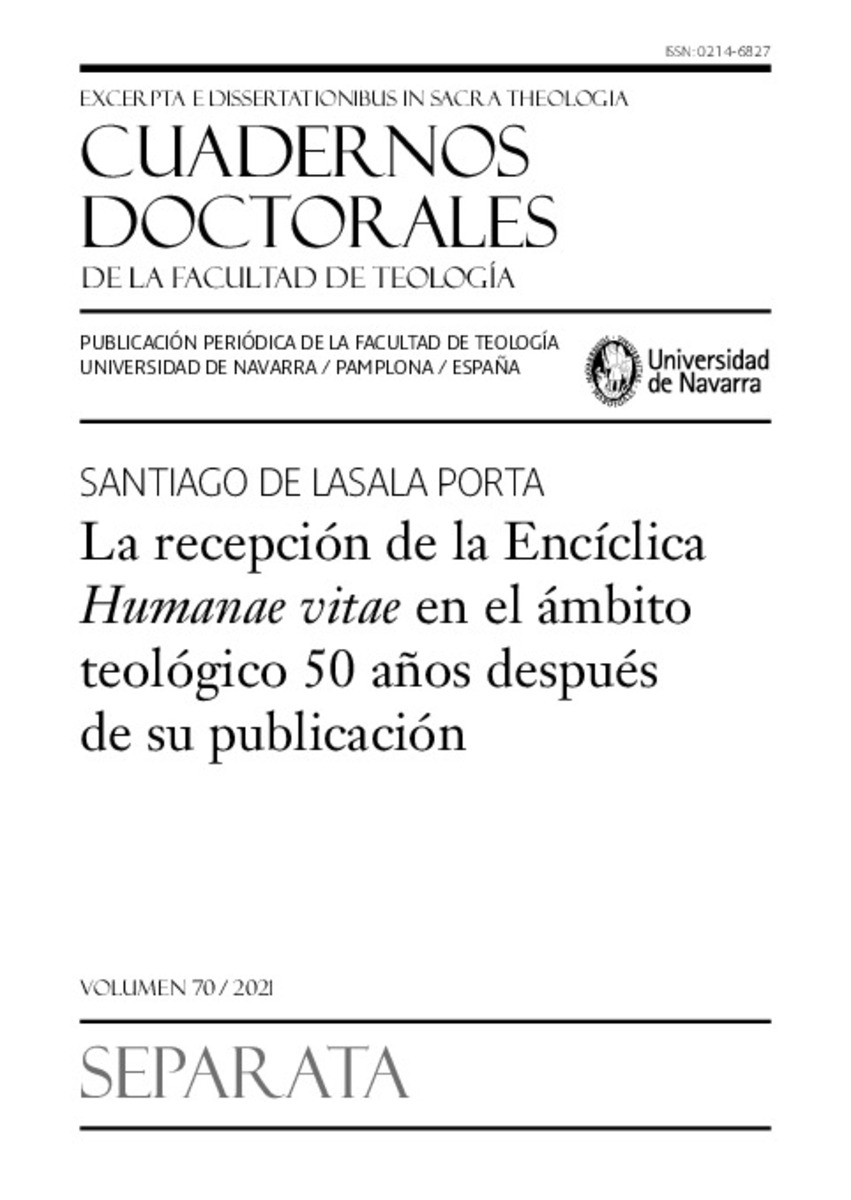Full metadata record
| DC Field | Value | Language |
|---|---|---|
| dc.creator | Lasala-Porta, S. (Santiago de) | - |
| dc.date.accessioned | 2021-06-21T10:58:30Z | - |
| dc.date.available | 2021-06-21T10:58:30Z | - |
| dc.date.issued | 2021 | - |
| dc.identifier.citation | Lasala-Porta, S. (Santiago de). "La recepción de la Encíclica Humanae vitae en el ámbito teológico 50 años después de su publicación". Cuadernos Doctorales de la Facultad de Teología. Excerpta e Dissertiationibus in Sacra Theologia. 70, 2021, 385 - 443 | es |
| dc.identifier.issn | 0214-6827 | - |
| dc.identifier.uri | https://hdl.handle.net/10171/60727 | - |
| dc.description.abstract | Esta tesis estudia la acogida que ha encontrado la encíclica Humanae vitae entre los teólogos de Alemania, Bélgica, España, Estados Unidos, Filipinas, Holanda, Italia y otros países en general, desde el momento de su publicación hasta los albores de su 50 aniversario. Se analizan las causas principales que produjeron un cambio en la conducta moral sexual de muchos matrimonios católicos, y los motivos que llevaron a San Pablo VI a escribir esta encíclica. Se recogen las reacciones que se produjeron en distintos episcopados del mundo tras la promulgación del documento: con qué espíritu fue recibido, cómo fue transmitido a los fieles, y en qué medida se siguieron las orientaciones que propone la encíclica. Uno de los argumentos más importantes que ha hecho que algunos teólogos no acepten el contenido de Humanae vitae, es la negación que hacen de la categoría de «mal intrínseco» y la adjudicación, entonces, a la conciencia de la función de decidir sobre lo que está bien o mal en cada situación concreta. Otro segundo argumento consiste en considerar que la encíclica no constituye una doctrina declarada de forma infalible, lo que equivale, por tanto, a afirmar que la enseñanza contenida es reformable. Analizando las consecuencias de estos y otros argumentos a lo largo del trabajo, no resulta difícil descubrir que no pocos teólogos, y no pocos fieles no han aceptado o no han asimilado completamente, hasta el día de hoy, parte de las enseñanzas contenidas en la encíclica Humanae vitae. | es_ES |
| dc.description.abstract | This thesis studies the reception of the encyclical Humanae vitae among theologians of Germany, Belgium, Spain, the United States, the Philippines, the Netherlands, Italy and other countries, from the moment of its publication until the dawn of its 50th anniversary. The thesis analyzes the main causes of the change in the moral sexual behavior of many Catholic couples, as well as the reasons that led St. Paul VI to write his encyclical. The reactions of the different episcopates throughout the world after the promulgation of this document are presented in a synthetic way, showing how the encyclical was variously received and transmitted to the faithful, and its guidelines followed. One of the most important arguments adduced by some theologians who do not accept the content of Humanae vitae consists in denying the category of «intrinsic evil» and the subsequent adjudication to individual conscience of the function of deciding on what it is good or bad in each concrete situation. A second argument consists in considering that the encyclical does not express an infallible doctrine, which is equivalent to affirming that the teaching contained therein is reformable. In the light of the consequences of these and other arguments studied in the thesis, it is not difficult to discover that not a few theologians –and not a few faithful– have not accepted or fully assimilated, to this day, some of the teachings contained in the encyclical Humanae vitae. | es_ES |
| dc.format.extent | 540 | es_ES |
| dc.language.iso | spa | es_ES |
| dc.publisher | Servicio de Publicaciones de la Universidad de Navarra | es_ES |
| dc.rights | info:eu-repo/semantics/openAccess | es_ES |
| dc.subject | Humanae vitae | es_ES |
| dc.subject | Ética Sexual Matrimonial | es_ES |
| dc.subject | Control de Natalidad | es_ES |
| dc.subject | Marital Sexual Ethics | es_ES |
| dc.subject | Birth Control | es_ES |
| dc.title | La recepción de la Encíclica Humanae vitae en el ámbito teológico 50 años después de su publicación | es_ES |
| dc.type | info:eu-repo/semantics/article | es_ES |
| dc.publisher.place | Pamplona | es_ES |
| dadun.citation.endingPage | 443 | es_ES |
| dadun.citation.publicationName | Cuadernos Doctorales de la Facultad de Teología. Excerpta e Dissertiationibus in Sacra Theologia | es_ES |
| dadun.citation.startingPage | 385 | es_ES |
| dadun.citation.volume | 70 | es_ES |
Files in This Item:
Statistics and impact
Items in Dadun are protected by copyright, with all rights reserved, unless otherwise indicated.






